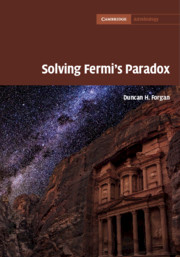
-
Select format
-
- Publisher:
- Cambridge University Press
- Publication date:
- 25 April 2019
- 02 May 2019
- ISBN:
- 9781316681510
- 9781107163652
- Dimensions:
- (247 x 174 mm)
- Weight & Pages:
- 1kg, 426 Pages
- Dimensions:
- Weight & Pages:
You may already have access via personal or institutional login
Book description
The search for extra-terrestrial intelligence (SETI) has for sixty years attempted to solve Fermi's paradox: if intelligent life is relatively common in the universe, where is everybody? Examining SETI through this lens, this volume summarises current thinking on the prevalence of intelligent life in the universe, and discusses sixty-six distinct solutions to the so-called paradox. It describes the methodology of SETI, and how many disciplines feed into the debate, from physics and biology, to philosophy and anthropology. The presented solutions are organised into three key groups: rare-Earth solutions, suggesting planetary habitability, life and intelligence are uncommon; catastrophist solutions, arguing civilisations do not survive long enough to make contact; and non-empirical solutions, those that take theoretical approaches, such as that our methodology is flawed. This comprehensive introduction to SETI concludes by looking at the future of the field and speculating on humanity's potential fate.
Reviews
'If intelligent life is common in the Universe, where is everybody? In this comprehensive review, Duncan Forgan presents a range of possible solutions to this question, and in doing so covers a lot of ground on the topic of SETI (the Search for Extraterrestrial Intelligence). From the outset, Forgan recognizes that this topic demands a multi-disciplinary approach that encompasses 'all of human knowledge', and in particular, expertise not only in the ‘hard sciences’ but also in social sciences and the humanities.’
Michael A. Garrett Source: The Observatory
Contents
Metrics
Altmetric attention score
Full text views
Full text views help Loading metrics...
Loading metrics...
* Views captured on Cambridge Core between #date#. This data will be updated every 24 hours.
Usage data cannot currently be displayed.
Accessibility standard: Unknown
Why this information is here
This section outlines the accessibility features of this content - including support for screen readers, full keyboard navigation and high-contrast display options. This may not be relevant for you.
Accessibility Information
Accessibility compliance for the PDF of this book is currently unknown and may be updated in the future.


